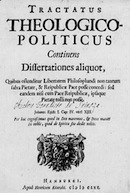
Source: Theologico-Political Treatise - Chapter II. of Prophets
Spinoza's Chapter 2. - knowledge of natural and spiritual phenomena cannot be gained from the words of the prophets (Page 1)
 It follows from the last chapter that, as I have said, the prophets were endowed with unusually vivid imaginations, and not with unusually, perfect minds... Men of great imaginative power are less fitted for abstract reasoning, whereas those who excel in intellect and its use keep their imagination more restrained and controlled, holding it in subjection, so to speak, lest it should usurp the place of reason.
It follows from the last chapter that, as I have said, the prophets were endowed with unusually vivid imaginations, and not with unusually, perfect minds... Men of great imaginative power are less fitted for abstract reasoning, whereas those who excel in intellect and its use keep their imagination more restrained and controlled, holding it in subjection, so to speak, lest it should usurp the place of reason.
Thus to suppose that knowledge of natural and spiritual phenomena can be gained from the prophetic books, is an utter mistake, which I shall endeavour to expose, as I think philosophy, the age, and the question itself demand. I care not for the girdings of superstition, for superstition is the bitter enemy, of all true knowledge and true morality.
Yes; it has come to this! Men who openly confess that they can form no idea of (Deus sive Natura), and only know Him through created things, of which they know not the causes, can unblushingly, accuse philosophers of Atheism. Treating the question methodically, I will show that prophecies varied, not only according to the imagination and physical temperament of the prophet, but also according to his particular opinions; and further that prophecy never rendered the prophet wiser than he was before. But I will first discuss the assurance of truth which the prophets received, for this is akin to the subject-matter of the chapter, and will serve to elucidate somewhat our present point.
Comment:
Here is our calm philosopher bristling because he is unfairly accused of Atheism. For Spinoza nothing shall replace reason. Modern thinking demands that reason be applied to the Bible and all superstition is to be exposed. He is shocked to be thought of as an atheist.